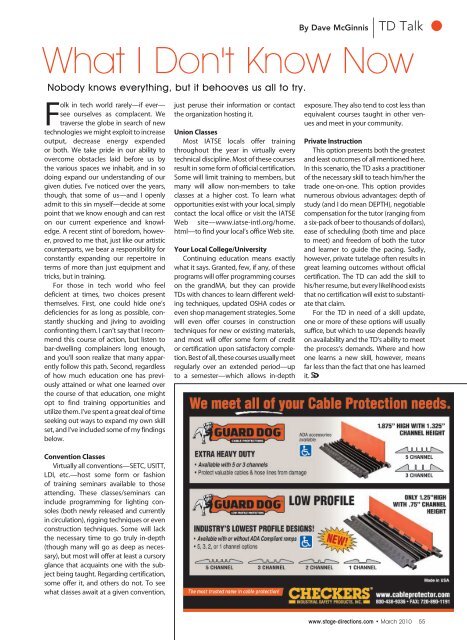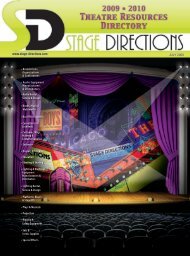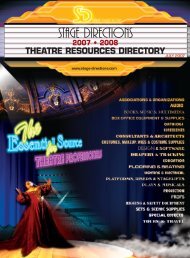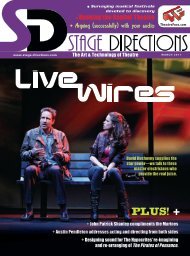Download a PDF - Stage Directions Magazine
Download a PDF - Stage Directions Magazine
Download a PDF - Stage Directions Magazine
Create successful ePaper yourself
Turn your PDF publications into a flip-book with our unique Google optimized e-Paper software.
What I Don't Know Now<br />
By Dave McGinnis<br />
|<br />
TD Talk<br />
Nobody knows everything, but it behooves us all to try.<br />
Folk in tech world rarely—if ever—<br />
see ourselves as complacent. We<br />
traverse the globe in search of new<br />
technologies we might exploit to increase<br />
output, decrease energy expended<br />
or both. We take pride in our ability to<br />
overcome obstacles laid before us by<br />
the various spaces we inhabit, and in so<br />
doing expand our understanding of our<br />
given duties. I’ve noticed over the years,<br />
though, that some of us—and I openly<br />
admit to this sin myself—decide at some<br />
point that we know enough and can rest<br />
on our current experience and knowledge.<br />
A recent stint of boredom, however,<br />
proved to me that, just like our artistic<br />
counterparts, we bear a responsibility for<br />
constantly expanding our repertoire in<br />
terms of more than just equipment and<br />
tricks, but in training.<br />
For those in tech world who feel<br />
deficient at times, two choices present<br />
themselves. First, one could hide one’s<br />
deficiencies for as long as possible, constantly<br />
shucking and jiving to avoiding<br />
confronting them. I can’t say that I recommend<br />
this course of action, but listen to<br />
bar-dwelling complainers long enough,<br />
and you’ll soon realize that many apparently<br />
follow this path. Second, regardless<br />
of how much education one has previously<br />
attained or what one learned over<br />
the course of that education, one might<br />
opt to find training opportunities and<br />
utilize them. I’ve spent a great deal of time<br />
seeking out ways to expand my own skill<br />
set, and I’ve included some of my findings<br />
below.<br />
Convention Classes<br />
Virtually all conventions—SETC, USITT,<br />
LDI, etc.—host some form or fashion<br />
of training seminars available to those<br />
attending. These classes/seminars can<br />
include programming for lighting consoles<br />
(both newly released and currently<br />
in circulation), rigging techniques or even<br />
construction techniques. Some will lack<br />
the necessary time to go truly in-depth<br />
(though many will go as deep as necessary),<br />
but most will offer at least a cursory<br />
glance that acquaints one with the subject<br />
being taught. Regarding certification,<br />
some offer it, and others do not. To see<br />
what classes await at a given convention,<br />
just peruse their information or contact<br />
the organization hosting it.<br />
Union Classes<br />
Most IATSE locals offer training<br />
throughout the year in virtually every<br />
technical discipline. Most of these courses<br />
result in some form of official certification.<br />
Some will limit training to members, but<br />
many will allow non-members to take<br />
classes at a higher cost. To learn what<br />
opportunities exist with your local, simply<br />
contact the local office or visit the IATSE<br />
Web site—www.iatse-intl.org/home.<br />
html—to find your local’s office Web site.<br />
Your Local College/University<br />
Continuing education means exactly<br />
what it says. Granted, few, if any, of these<br />
programs will offer programming courses<br />
on the grandMA, but they can provide<br />
TDs with chances to learn different welding<br />
techniques, updated OSHA codes or<br />
even shop management strategies. Some<br />
will even offer courses in construction<br />
techniques for new or existing materials,<br />
and most will offer some form of credit<br />
or certification upon satisfactory completion.<br />
Best of all, these courses usually meet<br />
regularly over an extended period—up<br />
to a semester—which allows in-depth<br />
exposure. They also tend to cost less than<br />
equivalent courses taught in other venues<br />
and meet in your community.<br />
Private Instruction<br />
This option presents both the greatest<br />
and least outcomes of all mentioned here.<br />
In this scenario, the TD asks a practitioner<br />
of the necessary skill to teach him/her the<br />
trade one-on-one. This option provides<br />
numerous obvious advantages: depth of<br />
study (and I do mean DEPTH), negotiable<br />
compensation for the tutor (ranging from<br />
a six-pack of beer to thousands of dollars),<br />
ease of scheduling (both time and place<br />
to meet) and freedom of both the tutor<br />
and learner to guide the pacing. Sadly,<br />
however, private tutelage often results in<br />
great learning outcomes without official<br />
certification. The TD can add the skill to<br />
his/her resume, but every likelihood exists<br />
that no certification will exist to substantiate<br />
that claim.<br />
For the TD in need of a skill update,<br />
one or more of these options will usually<br />
suffice, but which to use depends heavily<br />
on availability and the TD’s ability to meet<br />
the process’s demands. Where and how<br />
one learns a new skill, however, means<br />
far less than the fact that one has learned<br />
it.<br />
www.stage-directions.com • March 2010 55

















